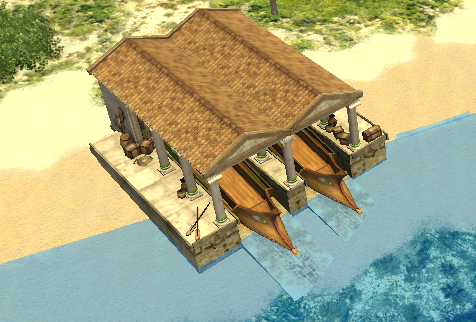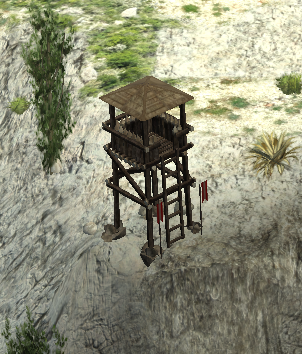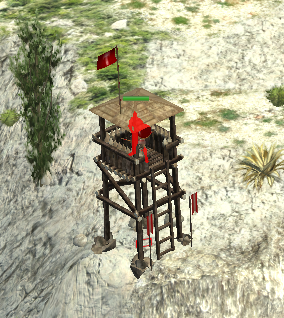-
Posts
2.300 -
Joined
-
Days Won
23
Everything posted by Nescio
-

Specific Name Review: Structures
Nescio replied to Doktoreus's topic in Game Development & Technical Discussion
What's fundamentally wrong with it is that the cothon is **not** a stone pier built in the sea: it is an artificial circular harbour dug out on land: and the term refers to the entire naval base (outer structures, water circle, optional island). -

Specific Name Review: Structures
Nescio replied to Doktoreus's topic in Game Development & Technical Discussion
Whether the Athenian acropolis was a single sanctuary with numerous temples and statues or an area with numerous separate, adjacent sanctuaries is not really important; I suppose both could be argued to be true. And no, Ephesus was never an integral part of Sparta, it was nominally an independent city-state, although in practice it had a succession of overlords (Athens, Sparta, Persia, Macedon, Seleucids, Ptolemies, Attalids, Rome). Anyway, that's beside the point. What matters is that there were multiple temples of Athena in Athens and presumably multiple sanctuaries of Artemis in the Spartan lands, therefore epithets are not only decorative but also distinctive. The ptol wonder is indeed problematic. Although built by the Ptolemies, the temple of Edfu is very much an Egyptian temple: Egyptian iconography, hieroglyphic inscriptions, traditional architecture, local cult, etc. I don't know of any relevant Greek epithets there and I doubt they could be found. I suppose ἱερόν τῆς Ἀπόλλωνος πόλεως “temple of Edfu” or ἱερόν τῇ Ἀπόλλωνος πόλει “temple in Edfu” could work (although there were multiple lesser Appolonopoleis, I don't think including the qualifier “Great” is necessary for us; there were also several mountains called Olympos in Greece). -

Specific Name Review: Structures
Nescio replied to Doktoreus's topic in Game Development & Technical Discussion
Exactly! Which is why I'm arguing in favour of including the epithets, to avoid confusing the temple of Athena Parthenos with that of Athena Nike (both are on the Athenian Acropolis), or the temple of Artemis Orthia in Lacedaemon with the far more famous temple of Artemis in Ephese. See Roman wonder (“Aedes Iovis Optimi Maximi”) for comparison. -

Specific Name Review: Structures
Nescio replied to Doktoreus's topic in Game Development & Technical Discussion
Epithets are meaningful. Why did you exclude it from the athen and spart wonders but include it in those of mace and sele? No objections; both τό ἱερόν “holy place” and ὁ νᾱός “temple, shrine” are correct, as is the more technical τό τέμενος “cut off land, sacred area, precinct, sanctuary” (roughly equivalent to Latin templum). Thanks, Aelian VH 6.12 is indeed clear; let's use Hoplothēkē “armoury” for the siege workshop then. -

Specific Name Review: Structures
Nescio replied to Doktoreus's topic in Game Development & Technical Discussion
Yes, neōsoikoi is indeed perfect for this: However, for a larger naval base, neōrion (sg) or neōria (pl) is certainly appropiate, e.g. a Greek equivalent to Carthage's cothon: (The actor of which is actually completely wrong, but that's a different discussion.) What exactly does your technology do? You could consider using some other phrase, e.g. ναυπηγοί naupēgoi “shipbuilders/shipwrights”. -
In case someone is curious (or ambitious):
-

Specific Name Review: Structures
Nescio replied to Doktoreus's topic in Game Development & Technical Discussion
Yes, but what might be done in the future is irrelevant. The current specific names ought to be based on the current wonders. How about the following? athen: temple of Athena Parthenos mace: temple of Olympian Zeus ptol: temple of Apollo sele: temple of Pythian Apollo spart:temple of Artemis Orthia Only if you want to; it's a suggestion, not an obligation; ergasterion “workshop” isn't perfect but does work. As for synergeion poliorkias, πολῐορκία means “siege of a city”, but συνέργειον = συνέργιον = συνεργᾰσία means “company or guild of fellow workmen” or “a place where many slaves are lodged, a workers' barracks”; thus not exactly what you mean, probably. Toxobolia is not an option, because the practice range is not limited to archery only; javelineers and slingers are trained there as well; and because τοξοβόλια is unattested. Where did you find it? No modern Greek, I hope? Hear are some terms you could consider: τό ἐμπόριον emporion: trading-station, also commercial port ὁ λῐμήν limēn: harbour ὁ λῐμήν κλειστός limēn kleistos: walled harbour τό ναυπεγεῖον naupegeion: shipyard τό ναυπέγιον naupegion: shipbuilder's yard, dockyard τό νεώριον neōrion: dockyard nāvālia in Latin ὁ νεώσοικος neōsoikos: dock, shipshed, slip, boathouse ὁ ὅρμος hormos: mooring place, dock, anchorage ἡ σκευοθήκη skeuothēkē: chest for all kinds of σκευή [equipment]; arsenal; shed for storing sails, masts, oars, etc. -
Minor tweaks: structures can no longer attack structures outposts no longer have attack or vision of there own; instead, outposts has aura which improves garrisoned unit; one unit can be garrisoned on it, instead of inside; can be killed indepently from outpost (cf. walls); ungarrisoned outpost: garrisoned outpost:
-

Specific Name Review: Structures
Nescio replied to Doktoreus's topic in Game Development & Technical Discussion
LSJ writes κέστρειον, not κέστεριον; probably too obscure, though; I only suggested it because ἐργαστήριον isn't perfect either. Whilst I agree looking for a Greek equivalent of arsenal makes sense, I'm not yet fully convinced ὁπλοτήκη “armoury” is what we want for the workshop; the word itself suggests shields etc. for melee infantry and the last excerpt given (Appian) implies they where separate from the war machines. There are probably more appropiate Greek terms somewhere. Maybe Polybius has something useful? Yes: the wonders. The Parthenon makes sense for the Athenians, but not really for Macedon and Sparta, therefore they should be given different names. I vaguely recall there was a large and important Artemis sanctuary in Lakedaimon; I don't know about Macedon, maybe a Zeus temple? For the Ptolemies, I've no objections to your suggestion to rename the temple of Edfu (Apollonopolis), interpretatio graeca was widespread. For the Seleucids, theirs was dedicated to the Pythian Apollo. -

Specific Name Review: Structures
Nescio replied to Doktoreus's topic in Game Development & Technical Discussion
Please reread earlier posts in this thread to avoid missing relevant points. τό στρατέγιον means “general's tent”, which is why I recommended ἡ στρατοπεδεία, ἡ στρατοπέδευσις, or ἡ στρατόπεδον “encampment” instead for the barracks using ἀγορά for the civic centre off all Greek factions for consistency and reserving βᾰσίλειον for a future palace structure is sensible. elephant stable with τῶν ἐλεφᾰ́ντων, as discussed earlier the practice range is not limited to archery exclusively, slingers and javelineers are trained there too, therefore we probably should use ψῑλοί “light troops” (i.e. ranged infantry) instead, e.g. ἡ στρατοπεδεία τῶν ψῑλῶν towers could be differentiated with the use of (attested) diminutives: wall tower: ὁ πύργος defence tower: τό πυργίον small tower: τό πυργίδιον as for the workshop, ὁ μηχᾰνητής “siege engineer” is a person/unit, therefore inappropiate for a place/structure; unless we can find a better alternative, I strongly recommend to stick with τό ἐργαστήριον “workshop” maybe we should try looking into a different direction. τό κέστρειον is probably a bit obscure, though Actually it could be done once for all Greek factions; updated earlier post: -
Personally I strongly recommend to use a single language/direct, rather than an amalgam taken from different ones. Some relevant things were posted in https://wildfiregames.com/forum/index.php?/topic/24046-voice-over-artist/ , perhaps those ought to be merged into here. Without people who know the language(s), nothing will change, though. Adding new civilizations is low priority, and rightly so: correcting, improving, and maintaining the existing ones is already a lot of work, none of those is finished yet. But if we are dreaming, then the most important gaps are in the 150-1 BC timeframe: Parthia and Greater Armenia peaked here and including Han China would be great too; Pontus is probably too unimportant. Other sensible additions could be Scythians, Thracians, Illyrians, Galatians, and Numidians.
-
But you can't build catalfalques
-
Let's stay on topic. I'm asking for clarification because I'm confused: several of your posts in this thread appear to be talking about different things. Posting what is desired is nice, but discussing how something could be implemented is important too. Some things that might seem easy are techically complicated (e.g. changing font), whereas some things that might sound daunting are actually quite easy (e.g. creating a mod).
-
Good question! It's something I tried in my mod as well, but reverted it, because I couldn't get it working. It is possible to have entities without armour and health (e.g. trees), but apparently not buildable things such as structures (because of foundations or build time?).
-

RfC: Improve discovery of multi-unit farming
Nescio replied to Krinkle's topic in Gameplay Discussion
What exactly do you mean? Your patch ( https://code.wildfiregames.com/D1803 ) was accepted and implemented in the development version two months ago and your name is in the credits. -
What is it exactly what you want? use the Greek alphabet (upper case only, simple, polytonic) for Greek specific names: can already be easily done with a mod render the entire game in ancient Greek: can be done with a translation (transifex) use a different font in game: requires knowledge of python script and possibly code changes release a font you created into the public domain: does not require 0 A.D. something else: ...
-
Thanks, I don't know how transifex works, but it would be great if you could do that! As for language tags, la for Latin, el for Modern Greek, grc for Classical Greek, and gmy for Mycenean Greek (although I highly doubt anyone is ever going to write that). I'll have a look at the plural form rules later.
-
First of all, Mauryas, please, not Mauryans (it took a long time to get this fixed). That could be done with a translation (via transifex); currently the available options (see Settings/Language in game) are modern languages, including Greek and Ukrainian, but in principle Classical Greek and Latin translations could be added—it would be great to have—but as with everything else, it requires motivated people to actually do the work. It doesn't matter something is paid for, what matters is under which licence the font is released by its creator (e.g. CC-BY-SA 4.0). That said, I wouldn't recommend you to spent time and money on it right now. Because the typical 0 A.D. player does not know any foreign scripts, the policy is and always has been to render native languages in the Latin alphabet. The idea to display other scripts is little more than a dream of something that might be nice to have in the distant future.
-
A missed opportunity. The adopted standard is not a one-to-one map and meaningful information (vowel length, accents) is lost. But if that's what you want, so be it, let's move on, there are inconsistencies waiting to be fixed. I've updated the trac wiki page accordingly. The game has no difficulty with displaying (polytonic) Greek, so that could be done in a mod already. As for the other languages, finding a font that supports Brahmi and Old Persian Cuneiform is not trivial.
-

RfC: Improve discovery of multi-unit farming
Nescio replied to Krinkle's topic in Gameplay Discussion
Each resource subtype (fish, fruit, grain, etc.) has its own gather animation, action icon, and gather rate. However, the automatically generated tooltips display a single food gather rate, which is the average of its subtypes; this is misleading and incorrect. Perhaps it should display individual gather rates for all resource subtypes; figuring out a way to do so without the tooltip becoming cluttered and potentially confusing is not trivial, though. And yes, food is now represented by a meat icon; perhaps someone ought to create a new one more representative of its subtypes, e.g. including fish, fruit, grain, and meat; it should remain clear at small size, of course. A very good point. What would you think best to replace the repair hammer with, a generic gather icon (e.g. a bucket), the resource icon (e.g. food), or the subtype icon (e.g. grain)? You're not mistaken, the farm field tooltip was corrected relatively recently in the devopment version (A24), see https://code.wildfiregames.com/D1803 for discussion. -

RfC: Improve discovery of multi-unit farming
Nescio replied to Krinkle's topic in Gameplay Discussion
It is actually the other way around: `template_structure_resource_field.xml` has `<DiminishingReturns>0.90</DiminishingReturns>`, which I believe means each subsequent worker is 10% less efficient than the previous, i.e. the first one 0.9^0=1, the second 0.9^1=0.9, the third 0.9^2=0.81, the fourth 0.9^3=0.729, the fifth 0.9^4=0.6561. The total of five workers on a single farm is 4.0951, i.e. 0.81902 on average. This is reflected in the tooltip: `<Tooltip>Harvest grain for food. Each subsequent gatherer works less efficiently.</Tooltip>`. -
As for the audio voices, I never listened to them, I always play games muted. Nonetheless, I don't expect them to be perfect; the Persian is reportedly Farsi (800 AD onwards—but probably Iran 2018), which is quite different from Darius' Old Persian (c. 500 BC). If you have the equipment, skill, time, and motivation to correct, update, and replace audio recordings, please, don't hesitate to go ahead.
-
Exactly! How something is written and how something is pronounced can be two different things. And the common English equivalent can be yet another thing too; however, that's not the discussion here, so perhaps rename this topic to “Transliteration of Ancient Greek” without “into English”. The standard itself can be perfectly suitable for others (e.g. library catalogues), yet be an inferior option for 0 A.D.'s specific situation. If you want to convince others, please provide strong arguments, and refute mine. No, certainly not! We can both be knowledgeable and yet vehemently disagree on something. Don't take it personal. It's not about winning a discussion. Although I proposed it, they are not my own ideas conjured up out of thin air—it's based on modern scholarship. If ignoring everything else, do take a careful look at the sources in the spoilers of my earlier posts. mea culpa The entire corpus of all European (in a geographic sense) languages up to c. 500 AD is about 90% Greek, 9% Latin, and a tiny remainder consisting of everything else. As for Celtic and Meroitic, my knowledge of those is practically zero, but I assume @Genava55 and @Sundiata know what they're doing. And I'm not even sure what is used for the Carthaginians (Hebrew?) and Iberians (Basque?). Anyway, let's just focus on Greek.
-
The AI doesn't use DropsiteMetal or DropsiteStone, instead, it uses the Storehouse class, which means it will build centres or storehouses near mines, even though it can only drop of iron at the forge. I made the forge a requirement for every phase, to ensure the AI builds one, but as a consequence its units move long distances to and from the mines.







